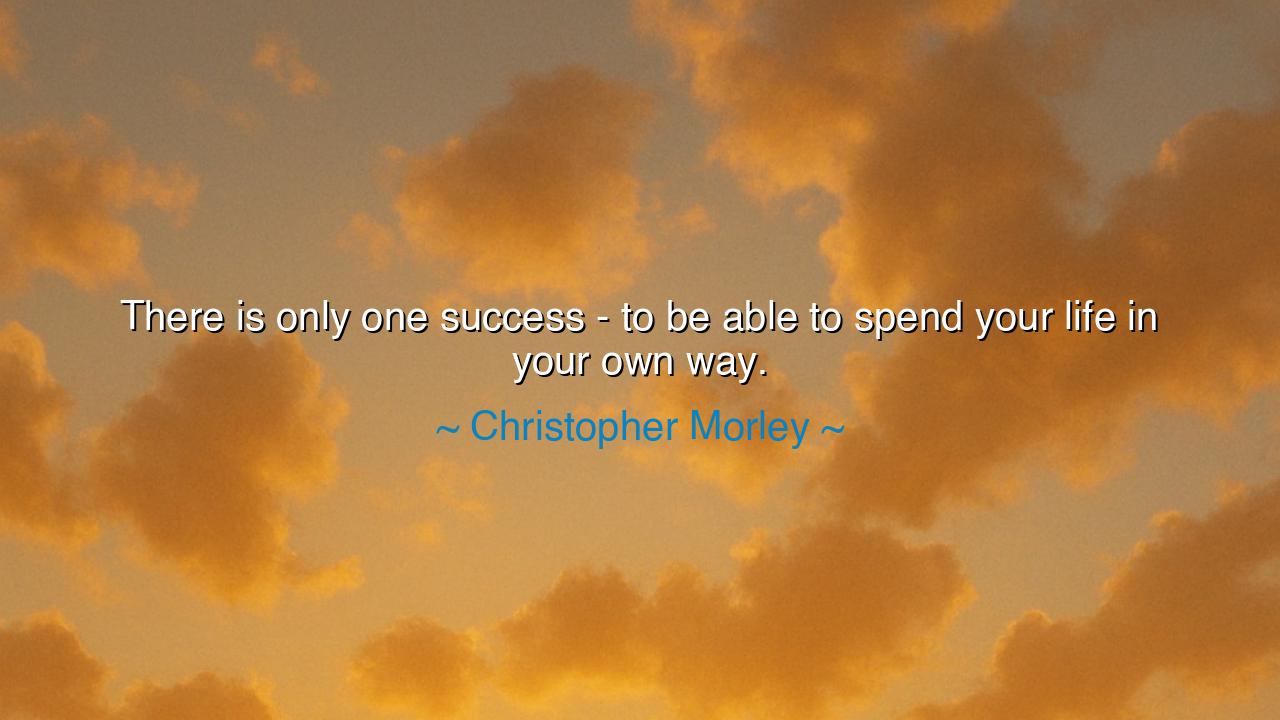
There is only one success - to be able to spend your life in your






"There is only one success - to be able to spend your life in your own way." These words, spoken by Christopher Morley, resonate deeply with the eternal pursuit of personal fulfillment and authenticity. Morley’s insight speaks to the heart of what it means to live a life that is truly yours, a life shaped by your choices, values, and passions. In a world that often encourages conformity, where the idea of success is too frequently defined by societal norms and external achievements, Morley reminds us that true success lies not in meeting others’ expectations but in being true to oneself. The ability to live life according to one’s own vision, without yielding to the pressures of the world, is, in his view, the ultimate measure of success.
In the ancient world, this notion of self-realization was a cornerstone of philosophical thought. The Greek philosopher Socrates famously stated, "Know thyself," urging individuals to engage in self-examination and align their actions with their innermost truth. Socrates believed that true wisdom came not from external achievements, but from understanding and living in harmony with one’s nature. To him, success was about realizing one's purpose and living a life that reflected one’s deepest convictions. This wisdom is echoed in Morley’s quote, which suggests that success is not determined by how others measure us, but by our ability to live in alignment with our own truth.
Similarly, the Stoics, particularly Epictetus, emphasized the importance of living according to one’s nature and accepting that true freedom and success come from within. Epictetus believed that freedom is not found in external possessions or achievements, but in the ability to govern oneself and live in accordance with virtue. For the Stoics, to live life in one’s own way was a form of self-mastery, a refusal to be controlled by external events or the opinions of others. In this sense, Morley’s vision of success aligns closely with Stoic philosophy: success is found in personal autonomy and the courage to walk your own path, even in the face of opposition.
Consider the example of Leonardo da Vinci, a man whose life was defined by his relentless pursuit of personal passion and creativity. Da Vinci did not follow the traditional paths expected of him, but instead charted his own course, engaging in a wide range of pursuits—painting, engineering, anatomy, and mathematics. His genius was not simply in his talent, but in his ability to live his life in his own way, free from the constraints of societal expectations. Da Vinci’s success was not measured by wealth or fame during his lifetime, but by the fulfillment he found in following his own curiosity and vision. His life serves as a testament to Morley’s belief that the greatest success is in the freedom to shape your own path and live your truth.
In more recent history, we can look to Mahatma Gandhi as another example of someone who defined success on his own terms. Gandhi’s life was marked by his commitment to nonviolence and his refusal to conform to the oppressive systems of British colonial rule. He rejected the idea of success as defined by wealth or power, instead dedicating his life to the cause of justice, truth, and freedom. Gandhi’s success was in his ability to live in accordance with his values and convictions, no matter the personal cost. His journey demonstrates that true success is not measured by external achievements, but by the courage to live according to one’s inner principles.
The lesson from both Morley’s quote and the stories of Socrates, Da Vinci, and Gandhi is profound: success is not a destination defined by wealth, status, or approval, but a journey rooted in the freedom to live in accordance with one’s own vision of life. It is found in the courage to choose a path that may not always align with conventional expectations, but that feels true to who we are at our core. To live a life in our own way, to pursue what we believe in, and to honor our personal values is the truest form of success.
In our own lives, we must strive to define success not by what society expects of us, but by what we know to be true for ourselves. Let us question the conventional markers of success—wealth, prestige, and external recognition—and instead focus on the things that bring us joy, peace, and a sense of purpose. Like Socrates, let us engage in self-reflection, examining our choices and ensuring they align with our inner truth. Like Da Vinci, let us follow our curiosity and embrace the full spectrum of our talents, even if they lead us down unconventional paths. And like Gandhi, let us live according to our highest ideals, regardless of the pressures to conform. By doing so, we embrace the freedom to live a life that is truly our own—a life that is, in every sense, a success.






AAdministratorAdministrator
Welcome, honored guests. Please leave a comment, we will respond soon